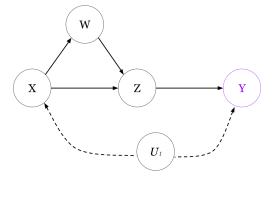Event Details:
Tuesday, November 30, 2021
8:30am - 9:30am PST
This event is open to:
General Public

Free and open to the public
All seminars are on Tuesdays at 8:30 am PT (11:30 am ET / 4:30 pm London / 5:30 pm Berlin).
Tuesday, November 30, 2021 [Link to join] (ID: 996 2837 2037, Password: 386638)
- Speaker: Thomas Richardson (University of Washington)
- Title: Single World Intervention Graphs: A simple framework for unifiying graphs and potential outcomes with applications to mediation analysis
- Discussant: Mats Stensrud (EPFL)
- Abstract: Causal models based on potential outcomes, also known as counterfactuals, were introduced by Neyman (1923) and later popularized by Rubin. Causal Directed Acyclic Graphs (DAGs) are another approach, originally introduced by Wright (1921), but subsequently significantly generalized and extended by Spirtes and Pearl among others. In this talk I will first present a simple approach to unifying these two approaches via Single-World Intervention Graphs (SWIGs). The SWIG encodes the counterfactual independences associated with a specific hypothetical intervention on a set of treatment variables. The nodes on the SWIG are the corresponding counterfactual random variables. This represents a counterfactual model originally introduced by Robins (1986) using event trees. This synthesis permits a simplification of Pearl's do-calculus that clarifies and separates the underlying concepts. In turn this leads to a simple counterfactual formulation of a complete identification algorithm for causal effects in models with hidden variables. By expanding the graph, SWIGs may also be used to describe a novel interventionist approach to mediation analysis whereby treatment is decomposed into multiple separable components. This provides a means of discussing direct effects without reference to cross-world (nested) counterfactuals or interventions on the mediator. The theory preserves the dictum ``no causation without manipulation'' and makes questions of mediation empirically testable in future randomized controlled trials.
This is joint work with James M. Robins (Harvard) and Ilya Shpitser (Johns Hopkins).
Related Topics
Explore More Events
-
Lecture
Data Feminism for AI
-John A. and Cynthia Fry Gunn Rotunda, E241 at the ChEM-H / Neuro, 290 Jane Stanford Way, 2nd floor, Stanford, CA 94305 -
Conference
2024 Stanford Data Science Conference
-Paul Brest Hall (Law School), 555 Salvatierra Walk, Stanford, CA 94305 -
Causal Science Center
Bay Area Tech Economics Seminar
-John A. and Cynthia Fry Gunn Rotunda, E241 at the ChEM-H / Neuro, 290 Jane Stanford Way, 2nd floor, Stanford, CA 94305
